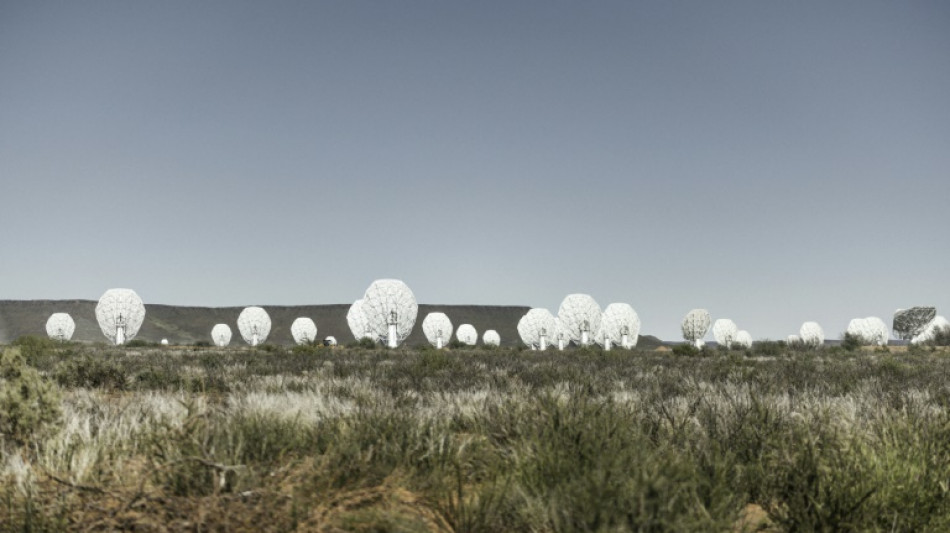
-
 Alcaraz secures ATP Finals showdown with great rival Sinner
Alcaraz secures ATP Finals showdown with great rival Sinner
-
England captain Itoje savours 'special' New Zealand win

-
 Wales's Evans denies Japan historic win with last-gasp penalty
Wales's Evans denies Japan historic win with last-gasp penalty
-
Zelensky renews calls for more air defence after deadly strike on Kyiv

-
 NBA's struggling Pelicans sack coach Willie Green
NBA's struggling Pelicans sack coach Willie Green
-
Petain tribute comments raise 'revisionist' storm in France

-
 Spain on World Cup brink as Belgium also made to wait
Spain on World Cup brink as Belgium also made to wait
-
Spain virtually seal World Cup qualification in Georgia romp

-
 M23, DR Congo sign new peace roadmap in Doha
M23, DR Congo sign new peace roadmap in Doha
-
Estevao, Casemiro on target for Brazil in Senegal win

-
 Ford steers England to rare win over New Zealand
Ford steers England to rare win over New Zealand
-
Massive march in Brazil marks first big UN climate protest in years

-
 Spain rescues hundreds of exotic animals from unlicensed shelter
Spain rescues hundreds of exotic animals from unlicensed shelter
-
Huge fire sparked by explosions near Argentine capital 'contained'

-
 South Africa defy early red card to beat battling Italy
South Africa defy early red card to beat battling Italy
-
Sinner beats De Minaur to reach ATP Finals title match

-
 Zelensky vows overhaul of Ukraine's scandal-hit energy firms
Zelensky vows overhaul of Ukraine's scandal-hit energy firms
-
South Africa defy early red card to beat Italy

-
 Alex Marquez claims Valencia MotoGP sprint victory
Alex Marquez claims Valencia MotoGP sprint victory
-
McIlroy shares lead with Race to Dubai title in sight

-
 Climate protesters rally in Brazil at COP30 halfway mark
Climate protesters rally in Brazil at COP30 halfway mark
-
Spike Lee gifts pope Knicks jersey as pontiff meets film stars

-
 BBC caught in crossfire of polarised political and media landscape
BBC caught in crossfire of polarised political and media landscape
-
'Happy' Shiffrin dominates in Levi slalom for 102nd World Cup win

-
 Palestinian national team on 'mission' for peace in Spain visit
Palestinian national team on 'mission' for peace in Spain visit
-
Brazilian 'Superman' cheers child cancer patients in Ghana

-
 India close in on win over South Africa after Jadeja heroics
India close in on win over South Africa after Jadeja heroics
-
Huge explosions rock industrial area near Argentina's capital

-
 Bezzecchi takes pole for Valencia sprint and MotoGP
Bezzecchi takes pole for Valencia sprint and MotoGP
-
Dominant Shiffrin leads after first slalom run in Levi

-
 Nine killed in accidental explosion at Indian Kashmir police station
Nine killed in accidental explosion at Indian Kashmir police station
-
Climate protesters to rally at COP30's halfway mark

-
 Fighting South Africa lose Rickelton after India 189 all out
Fighting South Africa lose Rickelton after India 189 all out
-
Harmer leads South Africa fightback as India 189 all out

-
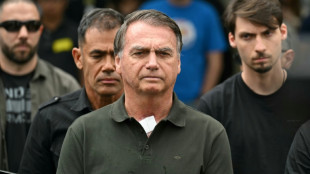 Prison looms for Brazil's Bolsonaro after court rejects his appeal
Prison looms for Brazil's Bolsonaro after court rejects his appeal
-
EU bows to pressure on loosening AI, privacy rules
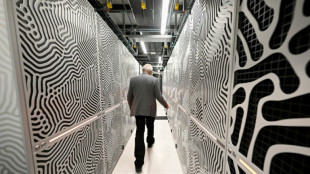
-
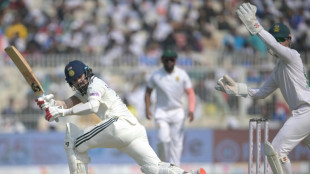 India close in on lead despite South African strikes
India close in on lead despite South African strikes
-
Curry's 49 points propel Warriors in 109-108 win over Spurs

-
 NZ boxer Parker denies taking banned substance after failed test
NZ boxer Parker denies taking banned substance after failed test
-
Australia setback as Hazlewood ruled out of 1st Ashes Test

-
 Australia pace spearhead Josh Hazlewood ruled out of 1st Ashes Test
Australia pace spearhead Josh Hazlewood ruled out of 1st Ashes Test
-
UN Security Council to vote Monday on Trump Gaza plan

-
 Japan's Tomono leads after men's short program at Skate America
Japan's Tomono leads after men's short program at Skate America
-
China tells citizens to avoid Japan travel as Taiwan row grows
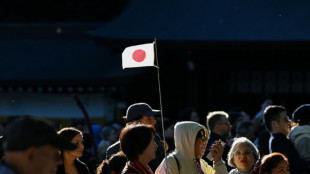
-
 Purdue Pharma to be dissolved as US judge says to approve bankruptcy
Purdue Pharma to be dissolved as US judge says to approve bankruptcy
-
Iran's first woman orchestra conductor inspires
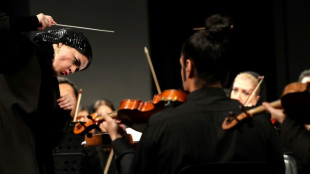
-
 Wood gets all-clear in boost for England
Wood gets all-clear in boost for England
-
Golf's world No. 8 Thomas has back surgery

-
 Rebooted Harlem museum celebrates rise of Black art
Rebooted Harlem museum celebrates rise of Black art
-
'Desperation in the air': immigrant comics skewer Trump crackdown


S.Africa's vast radio telescope draws new generation to the cosmos
When Lungelo Zondi first learnt about stars and galaxies at primary school in South Africa, she dreamt of having a live feed into the universe for uninterrupted space exploration.
Today, aged 25, her childhood vision has pretty much come true.
From her desk in Cape Town, Zondi monitors one of the world’s largest radio telescopes, the MeerKAT, made up of 64 giant white dishes that stand in a semi-desert region 600 kilometres (370 miles) away.
Through the screen of her computer, she can tune into radio signals emitted by stars and galaxies light-years away using the massive antennae that are 13.5 metres (44 feet) in diametre and turned up to the heavens.
"This is so interesting and fascinating: we're collecting data from the universe," Zondi said of the job of telescope operator at the South African Radio Astronomy Observatory (SARAO) that she started just two months ago.
Since 2005, SARAO has awarded 1,369 bursaries to students of applied mathematics, computer science, astrophysics and other subjects.
The bubbly engineering student is among them and part of a young generation of South Africans now able to look into the cosmos since the 2018 inauguration of the MeerKAT super radio telescope, which put the country on the map of global astronomy.
- World's most powerful -
As impressive as they are, the 64 dishes of the MeerKAT are just the start of an even bigger project, the Square Kilometre Array (SKA) Observatory that will be the world's most powerful radio telescope when it is completed by 2030.
The project will hook up another 133 South African dishes and more than 131,000 antennae based in Western Australia to allow humans to look back billions of years to when the "first stars and galaxies started lighting up the darkness", according to SKAO.
In the seven years since it was launched in the remote and sparsely populated Karoo region, MeerKAT has already "pushed the boundaries of scientific knowledge," said Adrian Tiplady, SARAO deputy managing director.
Its feats include groundbreaking radio images of the centre of the Milky Way, the discovery of immense radio galaxies stretching across millions of light-years, and the tracking of cosmic ripples through spacetime.
And with the MeerKAT programme to help train young South Africans, it is also keeping an eye on its future.
"It really covers the broad base of skills needed to actively participate in a global astronomy enterprise," Tiplady said.
"It has meant that the youth of South Africa now are excited about science, engineering and technology. We've really grown from a handful of radio astronomers some 10 or 20 years ago to a thriving and diverse community," he said.
An astrophysics group at the University of the Western Cape has benefited.
In 2011, "it started with just one South African faculty (member) at the time… and one student doing the PhD", Mario Santos, 50, professor in the university's physics and astronomy department, said.
"Now we have about 25 students and six faculty members," he added, saying the growth was "completely" linked to MeerKAT's development and South Africa’s selection as SKA host.
- Time machine -
In the control room at SARAO’s offices in Cape Town, Zondi and her colleagues monitor the health of the antennae and send them instructions to execute observations requested by scientists from all over the world.
There have been more than 1,200 submissions for observation time since 2019, with the biggest share from local research teams, Tiplady said.
"The world is watching us, so we have to make things perfect," said Sipho Molefe, another telescope operator. The 34-year-old studied electrical engineering and never imagined he would be working in astronomy.
"It makes people dream," he said. "There's a feeling that we're contributing to a bigger and larger environment in terms of information and development of technology."
The quiet and empty Karoo from where the MeerKAT's sensitive antennae listen to the universe was identified as holding tremendous potential for South African astronomy in the 1990s.
The facility operates in a "radio quiet zone" where radio waves, cell phone signals and wireless connections are strictly controlled to prevent interference with the telescope's tracking.
“When we're building a telescope, it's almost like building a time machine," Tiplady said.
"Something like MeerKAT or the SKA will detect radio signals that have been travelling through the universe since the birth of the universe itself.”
“It's a true marvel of scientific and technical excellence... and we're proud of South Africa to be a part of this,” he told AFP.
S.Barghouti--SF-PST



